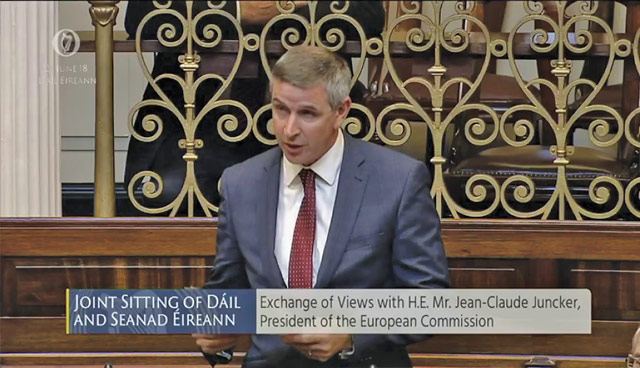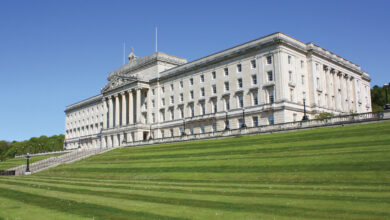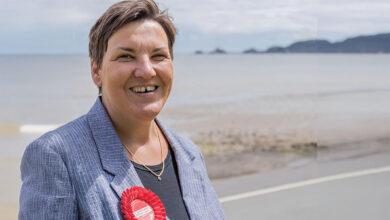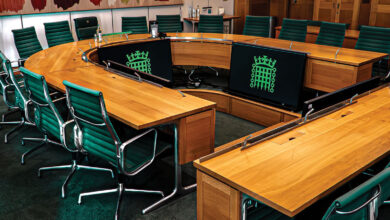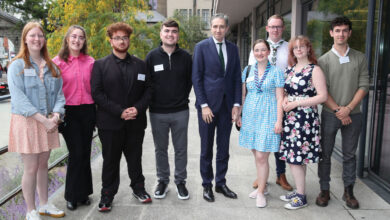Marshalling against Brexit
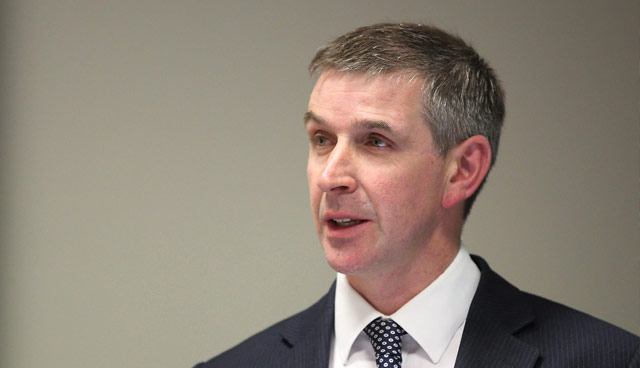
In April this year, an Armagh dairy farmer became the first northern unionist to be elected to Seanad Éireann. Ciarán Galway meets with Senator Ian Marshall in Leinster House for a broad ranging discussion.
“Being born into a family farm business, you grow up very much grounded in life. You are under no illusions about life and how hard and challenging it can be,” says Marshall, opening the interview.
Marshall’s dairying career lasted 31 years and his first encounter of agri-politics came at the age of 18. Ultimately, he rose to the rank of president of the Ulster Farmers’ Union.
“It’s as much about a way of life as it is about business, so you have to be very cognisant of all the social and cultural aspects of the industry. Once you face down angry farmers, you are pretty well prepared for other groups of people who feel aggrieved,” he jokes.
Speaking with Marshall immediately prior to the summer recess, he reflects on his initial experience in the second chamber. “I have been blown away by the sincerity of the welcome. Let’s be honest, you can be nervous about these things. I had very little knowledge about Leinster House, how it functions and what happens in here. But I have been encouraged by the willingness to help and I have been welcomed down here while being a completely open and transparent about who I am,” he outlines.
Respect
Emphasising that his initial encounters with the political parties in the Oireachtas has been positive, he insists that he has remained true to his principles. “There’s no show or bravado. It is not in my interest to be confrontational with people because I am down here to work. Anywhere you go in life, whether it be business or politics, it is about collaboration.”
As he has done on several occasions, on the issue of respect, Marshall makes reference to the book To Kill a Mockingbird and quotes Atticus Finch’s line which says: ‘You never really understand a person until you consider things from his point of view… until you climb into his skin and walk around in it.’
This, he explains, is what informs his base level of interaction with his colleagues. “I don’t agree with all the people I work with here. Politically, I am diametrically opposed to many of them, but I respect and understand their position.”
Rationale
Explaining his rationale for contesting the Seanad byelection as an independent, following former Labour Senator Denis Landy’s retirement from the agricultural panel in late-2017, Marshall indicates that he was first approached by European Commissioner for Agriculture and Rural Development Phil Hogan. Employed as Business Development Manager at the Institute for Global Food Security in Queen’s University Belfast, he received a phone call from An Taoiseach Leo Varadkar with the offer of a nomination.
“This was the middle of January when I was working in Queen’s and it came as something of a curveball. I had a conversation with the Taoiseach and then had to approach the university as my employer. I told them it was a huge honour for me to be nominated and they were completely supportive,” details the Senator.
However, Seanadóir Marshall had private reservations about the nomination and its ramifications for the wider political process in the North. “At that stage, the talks to restore the Northern Ireland Executive were very shaky and subsequently collapsed. I was concerned that I was a tokenistic pawn.” However, the Taoiseach provided a reassurance that he wanted a northern unionist voice in the Seanad as the perspective would add value and that there was no hidden agenda.
“Once I had that assurance, I was happy. I then had to run a campaign to lobby TDs and senators. It was good because I got to meet a lot of them one-on-one, through a few minutes of conversation to say who I was and what I was about. I felt even at that stage that there was an appetite – that the time was right for this to happen.
“When I go back and speak to people in the North or even to people here in Leinster House, what they are telling me is that the time is right. I am fortunate because, for a lot of our party-political representatives, to take a step like this would be very risky.”
Symbolism
For Marshall, there is no ambiguity, he is proud to be a northern unionist and Presbyterian. However, he acknowledges that some criticism has been directed at him by “some of the establishment in unionism”.
“I was flagged up as not being a ‘real’ unionist because I wasn’t a member of a party. In Leinster House, I was asked why I hadn’t got involved in politics north of the border and it’s simple. I’m not interested in green and orange politics. I’m interested in politics for the greater good.”
In the role, Marshall intends to use the “opportunity to sit in the national parliament, as a component of the legislative process and make a real difference to people’s lives”.
“I don’t agree with all the people I work with here. Politically, I am diametrically opposed to many of them, but I respect and understand their position.”
“Strong unionism is about sitting down with other people who have different opinions. Weak unionism is about circling the wagons. That has been reaffirmed by the support that I have received from across the board at home, albeit some privately from people who are uncomfortable supporting me publicly,” the Senator asserts.
“When I speak to senior DUP and UUP politicians who privately indicate their support for me in Leinster House, I ask them to publicly tell their people. They tell me that they couldn’t, that it’s a risky strategy and that they’d lose votes. That’s disappointing because there’s an opportunity there for strong leadership. I think it might only take one or two to break the mould.”
Reflecting on his youth, he recalls that his family had always been ‘moderate’ and respectful of the position of others. “We never hung out a flag on ‘the Twelfth’ fortnight and when I was around 17 or 18, I asked my father why we didn’t and suggested that we should. My dad replied that we didn’t have to hang out our colours to prove that we’re good unionists. That’s the way we were brought up. We knew that we were strong unionists and respectful of other traditions.”
Notably, Marshall is not the first member of the Seanad to emanate from the County Armagh village of Markethill. In 1982, Seamus Mallon was briefly appointed as a Senator by then Taoiseach Charlie Haughey. “I have huge respect for Seamus Mallon. As a northern nationalist, he lived in a Protestant village with union flags hanging and flute bands parading outside his house. When I look at the work that Seamus has done with regards to the relationship between unionism and nationalism, the changes have been for the better. The problem is that sometimes you have to go out of your comfort zone to make those changes,” he explains.
“When I first met Mary Lou McDonald, I told her that for my generation of Protestants and unionists who grew up through ‘the Troubles’, an Irish republican has a balaclava and an ArmaLite. An Irish republican is anti-union, anti-Protestant and anti-British.
“For the generation of people that I grew up with, this is their perspective, formed by the environment they grew up in. However, when you come to Leinster House, an Irish republican is a political animal. I told Mary Lou that I didn’t agree with her politics, but I respect them.”
Brexit
Turning to Brexit, Marshall passionately explains that when the EEC was established in 1957, there were two ambitions. One was to ensure security of food for Europe and to prevent future European wars. “Yes, there were issues that flared up in the former Yugoslavia, but for all intents and purposes, we have averted a major European war and simultaneously, we fed 550 million people. Therefore, the ambitions of 1957 have been delivered,” he argues.
“When you look back over the last 40 years and what they have delivered by way of human rights, animal welfare, for the environment and for business, the EU has worked. Now, in recent years it has become big and unwieldy, it probably needs a change, but this is being addressed.”
“At the minute, talk of reunification is unhelpful and is a bit of a distraction. The big elephant in the room at the moment is Brexit.”
Suggesting that the value of something is not fully recognised until it is gone, Marshall indicates his belief that the comfort and security of tariff-free access to the European market has been a fantastic opportunity that is taken for granted.
“I think the problem with the Brexit decision is that it was built on ideology. We have ideologists on the Brexit side who want to leave at all cost. This is a throwback to imperialism, to empire and to the great that was Britain. There are also ideologists who would remain at all costs. I don’t subscribe to that either.
“With the benefit of hindsight and all the information we have, what we have realised is that there was a lot of misinformation spread, a lot of mistruths and a lot of lies told, on both sides of this argument.”
Discussing the Brexit referendum itself, the Senator is critical of the ambiguity surrounding the leave arguments made in 2016. “Two years on, my position is that we now know that this isn’t straight forward or as simple as some thought it would be. If we look at business, academia or the legal profession, many areas of business, industry and society are inextricably linked to Europe. Meanwhile, the claims of promised dividends have now been taken apart. The benefits that were sold to the public initially aren’t on offer anymore,” Marshall critiques.
“If we leave under the current format, I, as one of the 48 per cent who elected to remain, will feel aggrieved and that I have been taken out of Europe against my will. It doesn’t bode well for uniting the country.
“The only way you get a resolution to this and get the political fraternity out of a corner is to show them the deal and have a second referendum. That way you give the power back to the electorate, who were misled. If the electorate decides that it still wants to leave given the information that they have, then I will respect that. At the minute I can’t respect a result that was built on lies and misleading information.”
Agri-food challenges
Marshall identifies trade and tariff free access to markets as the biggest challenge for the agri-food industry. “Obviously, our biggest market is Great Britain. That is critically important from both a Northern Ireland and an Ireland context. For Northern Irish agri-food business, the primary importance is retention of free access to the European market. That’s where they struggle with issues like backstop at the minute, where for them, whether it’s a notional or an actual border down the Irish Sea, that presents a problem for them. From a Dublin position, the access to that market is slightly different but equally as important,” he outlines.
From a farming perspective, trade with Europe is critically important. The Senator is critical of the suggestion that if the UK leaves the EU, it will open up fantastic opportunities to flood the UK with Northern Irish produce. “My fear is that if the UK leaves, it will open up the opportunity to import food, arguably produced at the same standards, but from countries where energy is cheaper, labour is cheaper and environmental constraints are not as prescriptive and therefore it can be imported at a lower cost. That is a big concern. This notion that Brexit presents opportunity, can be countered by asking why, if those opportunities exist post-Brexit, why do they not exist now?”
Criticisms
In spite of significant subsidies, farmers are not averse to criticism of the European project. “The thing that the farmer in the field will perceive to be the biggest problem with Europe is bureaucracy. However, I think you need to look at this holistically. If you consider the many different sectors of industry, they all will say that things have become very bureaucratic. This notion that agriculture is the only industry that’s very prescriptive and litigious is wrong.
“As Europe has expanded, farmers in the UK and Ireland have seen a flow of money eastwards. This is difficult for them. They sometimes deflect and pass blame for everything distasteful to Europe. In reality, very often the same set of rules applied to the UK and Ireland are also applied in France, Germany and Spain. When I have travelled, I have found that it’s about how you interpret these rules.
“The biggest challenge is about the bureaucracy and the red tape and a lot of it is perception because it exists in many parts of the world. As much as we criticise Europe for rules and high standards of regulation, it’s a brilliant opportunity because we’re regarded as quality assured, safe and traceable and we can use this to our advantage.”
Overall, Marshall suggests that Europe has been good at supporting agriculture. “The reality is that we have come through a long period of time whereby food has been sold below the cost of production and that is not sustainable. That has been supplemented by the Common Agricultural Policy which has given money to farmers.
“You have two choices to make and it’s not that complicated. In our current agricultural production system, you either pay farmers a subsidy to supply food or you pay more for food in the supermarket. There’s no in between here.”
Relations
Concluding the conversation and reflecting on his time in the Seanad so far, Marshall regards his election as a huge honour and identifies “a brilliant opportunity here to make the relationship between Belfast and Dublin both natural and normal”.
“A Taoiseach visiting Belfast should be a symbol of normal neighbourly relations rather than being a big song and dance. On an equal note, Arlene Foster and Michelle O’Neill should be in Leinster House in Dublin as normal business,” he suggests. At the same time, he laments that “the pro-Brexit stance of the DUP and Sinn Féin’s remain stance has effectively polarised the issue”.
Likewise, Marshall advocates the exclusion of discussions relating the reunification of Ireland from the wider Brexit discourse. “At the minute, talk of reunification is unhelpful and is a bit of a distraction. The big elephant in the room at the moment is Brexit. We need to deal with that and for those in this building who support the reunification of Ireland, I have no issue. I don’t subscribe to it.
“We have a number of issues and the argument goes, and I have heard it in Leinster House, that northern nationalism wouldn’t support a border poll to reunify because they’d be financially worse off, the education system is better in Northern Ireland and the health service is free at the point of delivery. Why would you vote to make yourself worse off?
“I think it’s good to have that discussion. But is the time right? I don’t think so. The fear within unionism at the moment is that if you enter into this discussion on a border poll, under the Good Friday Agreement, you’re going to trigger it every seven years and it will be a fait accompli. Those fears need to be allayed.”

